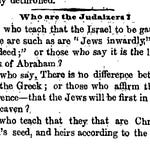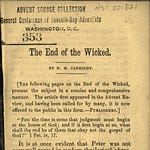The Baptist Tidings has noticed some remarks of mine on this subject, not long since published in the REVIEW. He says,
“A writer in the Advent Review, in speaking of the trinity, gives his reasons why he never adopted or tried to explain the doctrine. Some of his views are very sensible and logical. He by no means denies the full character, and works, and worship ascribed to Christ in the Bible. These are endorsed and unequivocally acceded to. The question with him seems to be solely in the use of the word trinity, as applied to God the Father, Son, and Holy Spirit. His objection is that it is unscriptural. That the term ‘trinity,’ or ‘triune God,’ does not occur in the Bible. This point, so far as the use of words is concerned, all will admit is well-taken. The use of the word cannot be defended on strict scriptural phraseology. Neither can some other doctrines, or scriptural truths, as theologically expressed, but which still are generally received. For instance, the common belief and expression, ‘immortality of the soul,’ ‘future rewards and punishment,’ as samples.”
The use of an unscriptural term is not my sole objection. A term not found in the Scriptures may truly express a scriptural idea. But when no term can be found in the Scriptures that will convey the idea, it looks suspicious, at least, that the idea, as well as the term, is unscriptural. As for the examples which the Tidings refers to as scriptural truths, though not found expressly stated in the Scriptures, we observe that the Bible does promise a reward to the righteous and punishment to the wicked, and the fact that they are promised makes them future. But the “immortality of the soul,” though ”generally received,” is not only an expression not found in the Scriptures, but the idea is not found there [either], except as the reward of the righteous, to be conferred at the resurrection of the just. If our friend had coupled with this example, “the first day of the week” as the “Christian Sabbath,” be would have had a pair of illustrations which would have fitted well to the doctrine under investigation, and with that doctrine would have formed a trinity, or at least a trio, not only of unscriptural expressions, but of unscriptural ideas and doctrines, all of which have been “generally received” from the “mother church,” without a scriptural investigation.
The Tidings defines the “trinity of God” as ”the three office of Father, Son, and Holy Spirit, in one divine and eternal Person.” This we take as his explanation of the doctrine. We understand that the term trinity means the union of three persons, not offices, in one God; so that
“The Father, Son and Holy Ghost,
Are three at least, and one at most.”
That one person is three persons, and that three persons are only one person, is the doctrine which we claim is contrary to reason and common sense. The being and attributes of God are above, beyond, out of reach of my sense and reason, yet I believe them; but the doctrine I object to is contrary, yes, that is the word, to the very sense and reason that God has himself implanted in us. Such a doctrine he does not ask us to believe. A miracle is beyond our comprehension, but we all believe in miracles who believe our own senses. What we see and hear convinces us that there is a power that effected the most wonderful miracle of creation. But our Creator has made it an absurdity to us that one person should be three persons, and three persons but one person; and in his revealed Word he has never asked us to believe it. This our friend thinks objectionable. He says,
“But the objectionable expression of the writer referred to is that in which he refuses to explain ‘that which is contrary to all the sense and reason God has given me.’ In this expression he puts his ‘sense and reason’ in direct antagonism to the doctrine of the trinity. Perhaps the word ‘contrary’ was only designed to mean out of reach of his sense and reason, or above them. If so, we have no objection. It may be true. But what sense and reason God has given him is not the measuring-rod of God himself.“
It is said in Proverbs 17:14: “The beginning of strife is as when one letteth out water; therefore leave off contention before it be meddled with.” Had I thought of this text, perhaps I should not have written my first article on the subject of the trinity. I never believed the doctrine, nor even professed to believe it. But I do not think it the most dangerous heresy in the world. This is the reason I have never before said I think that false views anything publicly about it of man's nature are more dangerous in these days of spiritualistic infidelity; and false views of God's commandments, which lead men to break them and teach men so, more dangerous still. This imperils the soul, according to the most solemn warning of our Saviour. But to hold the doctrine of the trinity is not so much an evidence of evil intention as of intoxication from that wine of which all the nations have drunk. The fact that this was one of the leading doctrines, if not the very chief, upon which the bishop of Rome was exalted 'to the popedom, does not say much in its favor. This should cause men to investigate it for themselves; as when the spirits of devils working miracles undertake the advocacy of the immortality of the soul. Had I never doubted it before, I would now probe it to the bottom, by that word which modern Spiritualism sets at naught.
Men have gone to opposite extremes in the discussion of the doctrine of the trinity. Some have made Christ a mere man, commencing his existence at his birth in Bethlehem; others have not been satisfied with holding him to be what the Scriptures so clearly reveal him, the pre-existing Son of God, but have made him the “God and Father” of himself. I do not purpose to add much to the barrels of ink that have been wasted on both sides of this question. I would simply advise all that love our Lord and Saviour Jesus Christ, to believe all that the Bible says of him, and no more. Then you will have the truth, and not occupy either of these extremes.
When Jesus says, “I and my Father are one,” do not add to it person, but understand them to be one, as two, three, or any number of Christians are one; for Jesus prayed that his disciples might be one, EVEN AS he and the Father are one. Understand that they are in perfect harmony, of one mind and purpose, one in design and one in action; they were one in creating the world, and one in redeeming it. Then when the same divine Son of God says, “MY Father is greater than I,” you will not make him contradict himself. But if you interpolate person, or being, you have a contradiction, and are obliged to resort to another invention, the “two whole natures”—the “Divinity and the humanity”— of which the Bible says nothing, to help you out. So when Jesus uses the pronouns I, my, or me, you guess that it is sometimes the humanity and sometimes the Divinity that speaks, as best suits the theory you have chosen to defend; thus virtually accusing the Saviour of double-mindedness, if not of double-dealing. Let Jesus and the Bible speak for themselves, and do not add to their words. Should you go into a store owned by a father and his son, and say to the son, I would like to see your father in relation to our business; and he should reply, “I and my father are one; he that hath seen me hath seen my father,” you would understand him as speaking figuratively. You would not go away and report that the son claimed that he and his father were but one person.
Christ was in glory with his Father before the world was. “And now, O Father, glorify thou me WITH THINE OWN SELF with the glory that I HAD WITH THEE before the world was.” The prayer has been answered. The Son of God is now glorified at his Father's right hand. He has “ascended up where he was before.” The two-whole-nature swivel must turn pretty fast in the interpretation of these passages, especially as it is the Son of Man that ascended. He was the Son of God before the Father sent him into the world; he became the Son of Man when he was made flesh and dwelt among us; yet he is the same being he was before. How can these things be? They are beyond our sense and reason, but not contrary to them.
Our sense and reason are very limited. They cannot comprehend the mighty works of God; but the little we have, he doubtless intended we should use in the investigation of his word. He has not violated, nor asked us to violate, the little sense and reason we have. Revelation goes beyond us ; but in no instance does it go contrary to right reason and common sense. God has not claimed, as the popes have, that he could “make justice of injustice,” nor has he, after teaching us to count, told us that there is no difference between the singular and plural numbers.
Let us believe all he has revealed, and add nothing to it.
R. F. COTTRELL.










